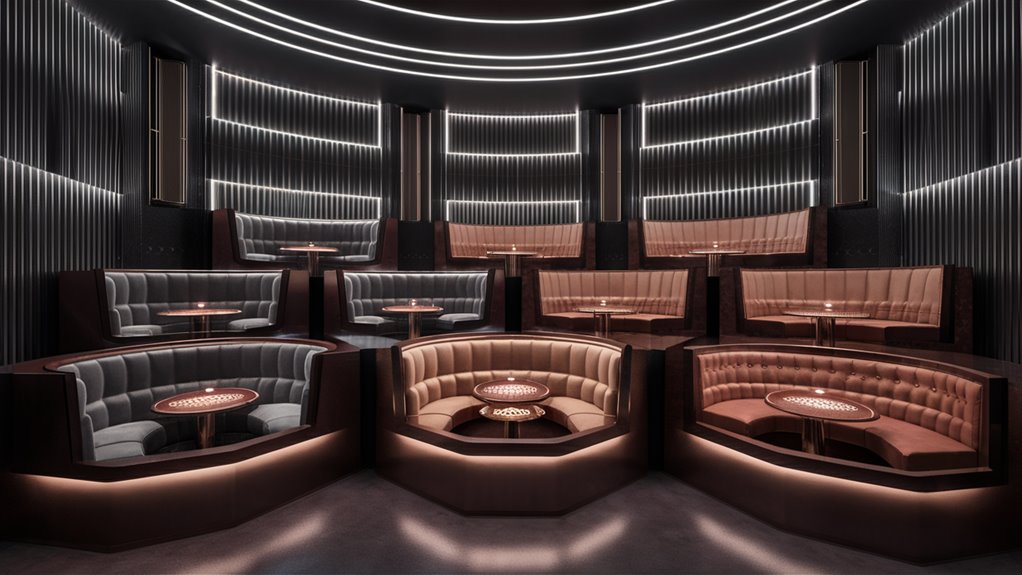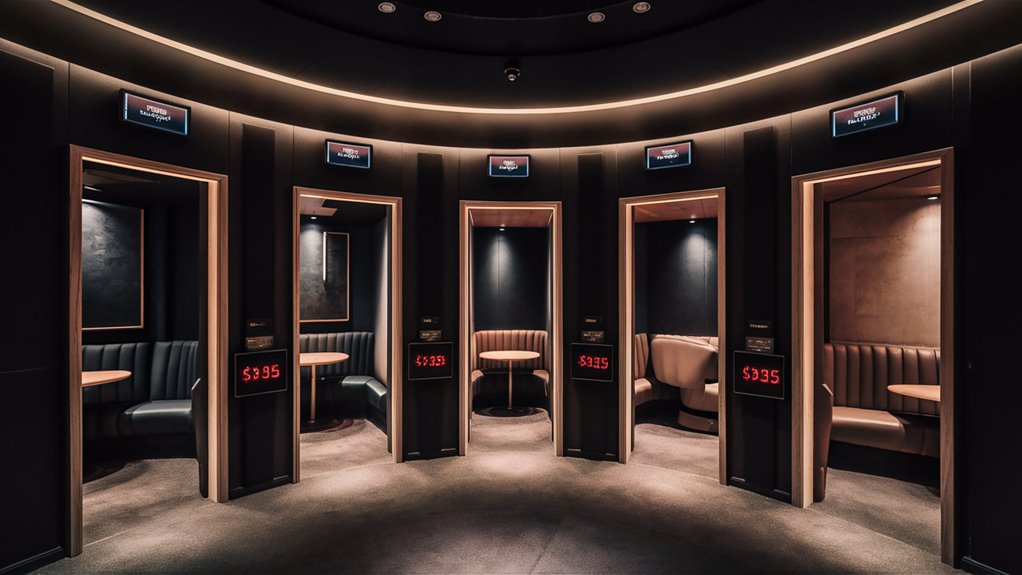Karaoke Pricing Strategy

Karaoke pricing involves complex market rules beyond basic supply and demand. Premier venues carefully evaluate room rates based on various factors impacting profitability. 호치민 퍼블릭가라오케
Variable Pricing: Peak and Off-Peak
During peak hours, such as evenings and weekends, higher prices are implemented to match increased demand. Karaoke venues employ dynamic pricing strategies influenced by:
- Weekend rate increases
- Late-hour surcharges
- Early-bird discounts
- Holiday price spikes
Influence of Room Size and Technology
Venue costs fluctuate significantly depending on room facilities and technology:
- High-quality audio systems
- Professional microphones
- Clear display screens
- Various room sizes
- Private room amenities
Target Market Segmentation
Karaoke businesses tailor their pricing models to specific customer segments:
- Corporate events
- Birthday parties
- Large group gatherings
- Frequent visitors
Investment in Technology and Maintenance
Expenditure levels heavily influence room pricing through:
- Song library updates
- Equipment maintenance
- Software licensing fees
- System upgrades
- Technical support
Competitive Positioning and Offerings
Strategic venues adjust their pricing frameworks by evaluating:
- Local competitors
- Service quality
- Brand positioning
- Customer experience offerings
- Location accessibility
Peak Time Pricing Dynamics
Understanding Peak Pricing in Karaoke Venues
Prime Time Pricing Adjustments
Peak time rates vary based on high-demand periods.
Weekend and holiday prices typically escalate 30-50% above standard rates during key social hours from 8 PM to midnight on Fridays and Saturdays.
These significant increases reflect high demand for prime fun hours.
Strategic Pricing Approaches
Dynamic pricing mechanisms adopted by karaoke venues reflect sophisticated revenue optimization strategies common in entertainment sectors.
A standard karaoke room priced at $50 during off-peak can reach $75-$85 during peak periods.
This demand-driven pricing model responds effectively to user behavior and occupancy rates.
Time-Based Pricing Strategies
Advance Booking Incentives
Venues implement graduated pricing plans segmenting the evening into parts.
Early evening slots generally offer moderate rates, whereas late-night sessions incur higher fees.
Effective booking strategies include:
- Early bookings for prime slots
- Selecting off-peak hours for savings
- Booking early night slots to avoid high charges
- Group discounts during off-peak hours
This strategic time-based pricing policy enables venues to manage occupancy while maximizing revenue throughout operating hours.
Room Size and Technology Aspects
Room Pricing in Karaoke: Influence of Size and Technology
Room Dimensions and Capacity
Room size is crucial in determining karaoke venue pricing.
Larger karaoke rooms naturally command higher fees due to accommodating more guests and offering more space for relaxation.
Expansive entertainment areas provide additional space for socializing and singing together, significantly impacting pricing strategies.
State-of-the-Art Audio Technology
Professional audio equipment is a vital factor influencing karaoke room pricing.
Venues featuring advanced sound systems offer:
- Acoustic solutions
- Noise-cancellation technology
- High-quality speakers
- Advanced microphone systems
These attributes justify higher prices due to superior sound quality.
Technology-Driven Pricing Tiers
Room size and technological advancements create distinct pricing categories.
Premium karaoke venues equipped with:
- Soundproofing technology
- Cutting-edge sound equipment
- High-tech room controls
demand significantly higher rates compared to basic setups.
Technology Enhancing Experiences
Modern karaoke venues utilize innovative technologies to deliver superior experiences through:
- LED lighting arrangements
- Interactive touch screens
- Digital song selection
- Streaming capabilities
These technological features validate premium pricing by enhancing entertainment value.
Location and Competitive Landscape
Karaoke Venue Pricing: Location and Market Dynamics

Location-Based Pricing Strategies
Geographic location significantly influences karaoke venue pricing across various markets.
Urban centers with dense populations attract higher fees due to increased operating costs and elevated demand levels.
Urban venues consistently maintain higher room rates than suburban or rural establishments, reflecting the competitive dynamics of densely populated areas.
Competition Factors
Market competition plays a crucial role in determining appropriate pricing strategies.
Venues situated in areas with numerous nearby competitors must adopt sophisticated pricing techniques to maintain market position while ensuring profitability.
Continuous market analysis and benchmarking provide valuable insights into local pricing trends, offerings, and customer preferences.
Demographic Considerations
Demographic factors heavily influence pricing optimization strategies.
Affluent areas can support higher room charges, whereas cost-sensitive regions require adaptable pricing models.
Understanding local consumer behavior and spending patterns allows venues to establish price points aligned with target demographics.
Prime Locations
Strategically positioned venues near entertainment hubs, transportation links, and commercial centers justify premium rates.
These essential advantages enhance venue appeal and perceived value, enabling businesses to command higher prices while fulfilling market demand.
Location-based pricing must align with competitive positioning and profitability objectives, fostering sustainable business models in the karaoke entertainment sector.
Revenue and Profit Management
Revenue Optimization and Profit Management in Karaoke Venues
Strategic Pricing and Profit Maximization
Revenue optimization and profit margin management are critical components of a successful karaoke venue. New establishments must balance expenses against diverse revenue streams to achieve financial stability.
Venue profit margins typically target a range of 20-35%, requiring sophisticated pricing techniques and supplementary revenue channels.
Diversified Revenue Streams
Multiple income sources support sustainable karaoke operations:
- Hourly rental fees
- Additional services like microphone rentals
- Food and beverage sales
- Peak period premium charges
- Event packages for large gatherings
Space Utilization and Cost Control
Efficient space planning impacts revenue generation. Smaller rooms often yield higher profit margins due to lower overhead, while large premium rooms generate greater total revenue despite requiring more resources.
Peak pricing during weekend evenings generates essential revenue that offsets slower periods.
Investment in Technology and Financial Planning
Investing in technology is crucial for long-term success:
- High-quality audio systems
- Comprehensive digital song catalogs
- Advanced booking systems
- Room management technology
These technological investments necessitate strategic pricing to achieve balance, supporting robust business growth while remaining competitive.
With disciplined financial oversight and strategic pricing, karaoke venues can develop resilient business models that harmonize customer experiences with operational efficiency.
Customer Experience Pricing
Enhancing Customer Experience Through Pricing in Karaoke Venues
Adaptive Pricing in Modern Karaoke Industry
Customer-driven pricing strategies have transformed the karaoke venue landscape, replacing fixed rates with dynamic pricing models that align closely with consumer demands and market expectations.
Leveraging data insights and customer behavior analysis, venues can craft pricing solutions that enhance both satisfaction and profitability.
Tailored Pricing Packages and Target Markets
Innovative karaoke venues now offer flexible pricing plans designed for diverse customer segments:
- Variable rates for peak and off-peak hours
- Discounted packages for large groups
- Corporate event packages with premium amenities
- Birthday packages with enhanced features
- Extended sessions for more singing time
Technology Enhancing Pricing Flexibility
Advanced pricing technology allows real-time price adjustments based on:
- Current demand levels
- Seasonal variations
- Special occasions
- Venue capacity
- Booking times
Segmented Pricing Approaches
Targeted market analysis leads to pricing strategies for distinct demographics:
- Young professionals: Short, high-energy sessions
- Corporate clients: Premium packages with business amenities
- Social groups: Long bookings with group discounts Scoring Systems in Karaoke: Do They Really Matter?
- Loyal customers: Reward programs for continued patronage
- Special events: Customized packages for major celebrations
Value-Based Pricing Optimization
Effective pricing strategies achieve equilibrium by considering:
- Market positioning
- Revenue maximization
- Perceived value
- Operational sustainability
- Market trends
